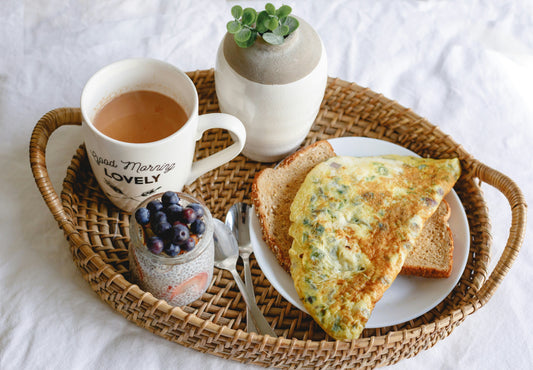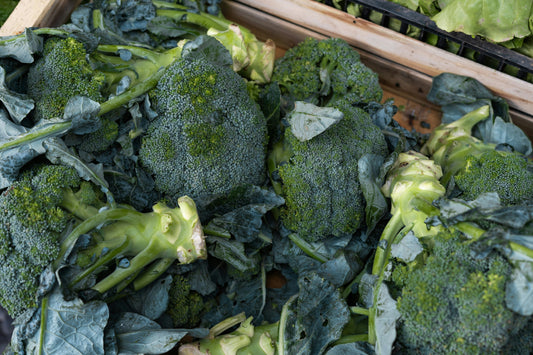I often hear that the reason an individual or family 'can’t' eat a diet based around whole foods is because their perception is that it is too expensive in comparison to purchasing packaged and processed foods. I disagree, a whole foods diet doesn't have to be expensive or full of the latest trendy ‘health food’ products, here are my top tips for reducing your food bill and increasing your nutrient intake:
Increase your vegetable intake
I encourage you to fill up on water-based vegetables; spinach, salad greens, broccoli, cabbage, cucumber, cauliflower, and celery are some of the cheapest vegetables available and some of the most nutrient-dense foods on the planet. Aim to have 7 servings of water based vegetables each day. One serve is what you can comfortably hold in your hand. So one serve of broccoli for a child would be smaller than a large man.
Buy in season and local
In season and local food is cheaper due to fewer costs to grow and transport the food. Local farmers markets, orchards, and farms are a great way to get low-cost high-quality food and support local business at the same time.
Reduction of animal products and the introduction of meat-free meals
There is an extremely strong argument for reducing meat consumption for improved health. There is a strong association between processed meat (ham, sausages, salami) and an increased risk of colorectal cancer; the World Health Organisation suggest dramatically reducing your intake or excluding it from your diet altogether.
A diet high in animal proteins has been linked with cancers, heart disease and osteoporosis. While high plant diets have been associated with reduced risk of obesity, diabetes, and all-round improved health.
You can get the protein you need from plant foods. Some plant foods are complete proteins - meaning they contains all amino acids needed by humans. Other plant proteins are incomplete proteins and can be combined with other plants to ensure you get all essential amino acids in a meal.
Here are a few complete plant proteins:
Chia seeds
Tempah
Hemp Seeds
Quinoa
Here's how to combine plants to ensure you are getting all of your amino acids:
Legumes + whole grains
Beans + brown rice
Lentils + brown rice
Legumes + nuts or seeds
Chickpeas + almonds
Beans + tahini
Reduce your portion size
Most people consume positions that are far too large. You should be aiming to have 3-5 handfuls of water-based vegetables, a fist-sized portion of legumes or beans, or a palm-sized portion of meat or fish. If you need starchy carbohydrates with your meal (not everyone needs this after filling up on water based vegetables), then a fist sized portion should be enough. You also want to include some whole food fats like; half an avocado or a 1/4 cup of nuts and seeds. I always recommend starting with a smaller portion than you think you want to eat, eat this then wait 10 minutes. If after 10 minutes you are still hungry then have a little more.
Buy in bulk
There are several whole foods co-ops throughout New Zealand and Australia, these are a great way of buying food in bulk at cheaper prices. You can also find great deals at bulk bin stores. Dry goods like rice, quinoa, beans and lentils keep really well for long periods of time as long as they are sealed. Nuts and seeds are best stored in the freezer, tightly sealed, this prevents the fats from going rancid. In season fruit and vegetables can be bottled, dried or frozen - giving you off-season produce for other seasons.
Make your own
Buying snack bars, lunch box treats and ready to go snacks can be very expensive, and full of sugar and additives that you simply don't need. You can make snacks at home from nuts, seeds, coconut, oats and dried fruit. Most whole food snacks can be frozen too, so make a big batch and freeze half for another week.
Here are some recipes to get you started:
Hormone Balancing Chocolate Bars
Raw Lemon Slice
Healthy Chocolate Fudge
Grow your own
I find that herbs, limes and lemons can be particularly expensive even when they are in season, so I grow my own. Lime and lemon trees don't take any effort at all, and many varieties start producing lots of fruit straight away. Once lemon trees get large enough they will produce fruit almost year round. Herbs are very easy to grow too, you can grow them on the windowsill or outside in a small pot. If you grow the herbs inside you can have fresh summer herbs like basil and coriander year round, while herbs like thyme, rosemary and parsley are a little hardier and can survive outside.




